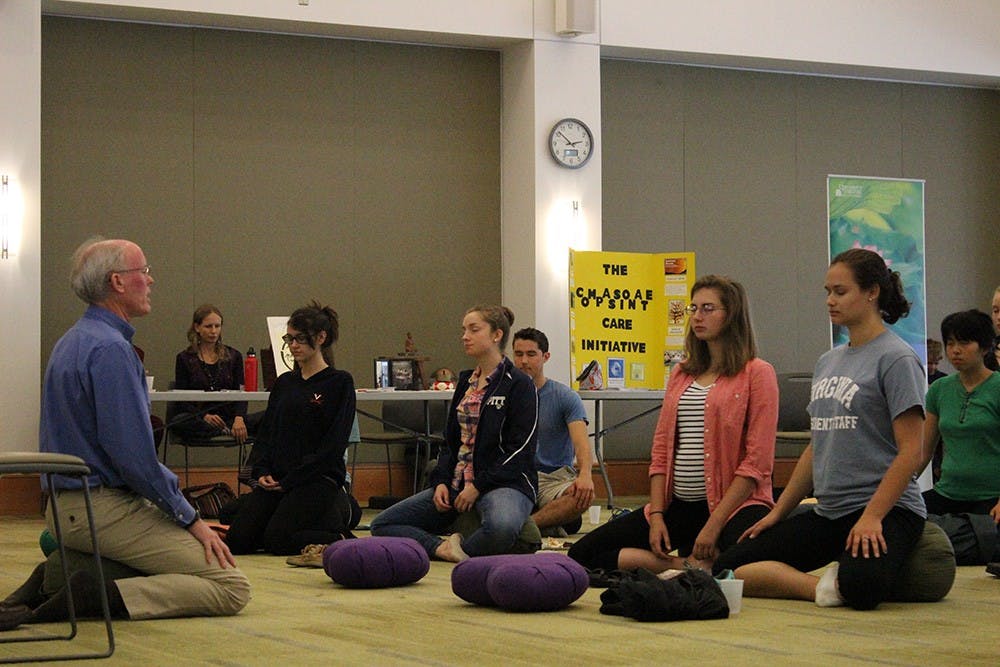Commerce graduate student Chip Grossman appeared to have it all as a freshman at Colby College. He achieved success on the lacrosse field and in the social sphere, but still faced stress and anxiety. After the death of his teammate, Grossman found himself in a dark place. He learned of his former teammate’s interest in meditation and began attending sessions himself.
“They had a good meditation community set up at Colby,” Grossman said. “I started going to that and I started realizing that we have the power to control our anxiety to some degree by becoming more aware of it.”
Now, Grossman is working to create a meditation community at the University. Grossman, along with several other students, started Contemplation at U.Va. last spring — a CIO dedicated to providing students with opportunities to explore the contemplative sciences, including meditation, yoga and mindfulness.
To get the CIO off the ground, students worked with the Contemplative Sciences Center. Second-year College student Kimia Nikseresht became interested in collaborating to establish a club after taking a yoga class last semester.
“[My TA and I] noticed there was a gap between something that could be beneficial but is not available,” Nikseresht said. “We had to make these practices affordable and accessible.”
Meditation is a powerful way to deal with the stresses and anxieties associated with the hectic lifestyle of college, Grossman said.
“It’s like exercise for your brain that your brain really needs,” Grossman said. “We live in a world of constant stimulation and it’s draining on the mind and body. Meditation helps you come back to a more relaxed state of being, which in turn, fosters creativity and happiness. It’s not just a theory; the science is proving this.”
Along with the students, the Contemplative Sciences Center has been crucial to expanding these practices on Grounds. Leslie Hubbard, Program Director at the Center, teaches contemplative science classes, leads retreats and provides weekly meditation and yoga practices.
“[Contemplative sciences are] a great blend of different types of traditions that cross over in the spiritual field, health and wellness and excelling academically too,” Hubbard said. “It’s finding different ways to cope with things like stress or bigger questions like ‘What am I doing here?’”
Contemplation at U.Va. aims to do more than provide activities and resources for students — the CIO members want to create a community.
“Contemplation at U.Va. is very inclusive,” Hubbard said. “I think it’s really important to come together as a community, to identify with a community [of people] you feel are your friends but also you can confide in [them] with these bigger questions that come up.”
The students involved with Contemplation at U.Va. realize they face a challenge in integrating traditionally Eastern practices on a campus with very little Eastern influence.
“What it comes down to is getting people on board, one at a time,” Grossman said.
Once the skepticism fades, Grossman, Nikseresht and Hubbard hope students see this sort of club as especially necessary for the high pressure, fast paced climate of the University.
“We think that if for an hour a week we can help someone quiet their minds and relax, that might relieve some of the anxiety and stress we see so much at U.Va.,” Nikseresht said.
Nikseresht and Grossman, along with the other students involved in Contemplation at U.Va., spend many hours participating in yoga and meditation to ensure they can foster this climate.
“I think there are some really good seeds being laid in the ground,” Grossman said. “In all my heart, I believe that this will take a positive growth turn.”
Contemplation at U.Va. will continue to collaborate with the Contemplative Sciences Center to make meditation, yoga and mindfulness more present — as well as less daunting.
“These are huge idealistic goals, but one step at a time we are trying to make Grounds a little more happy and peaceful,” Nikseresht said.







